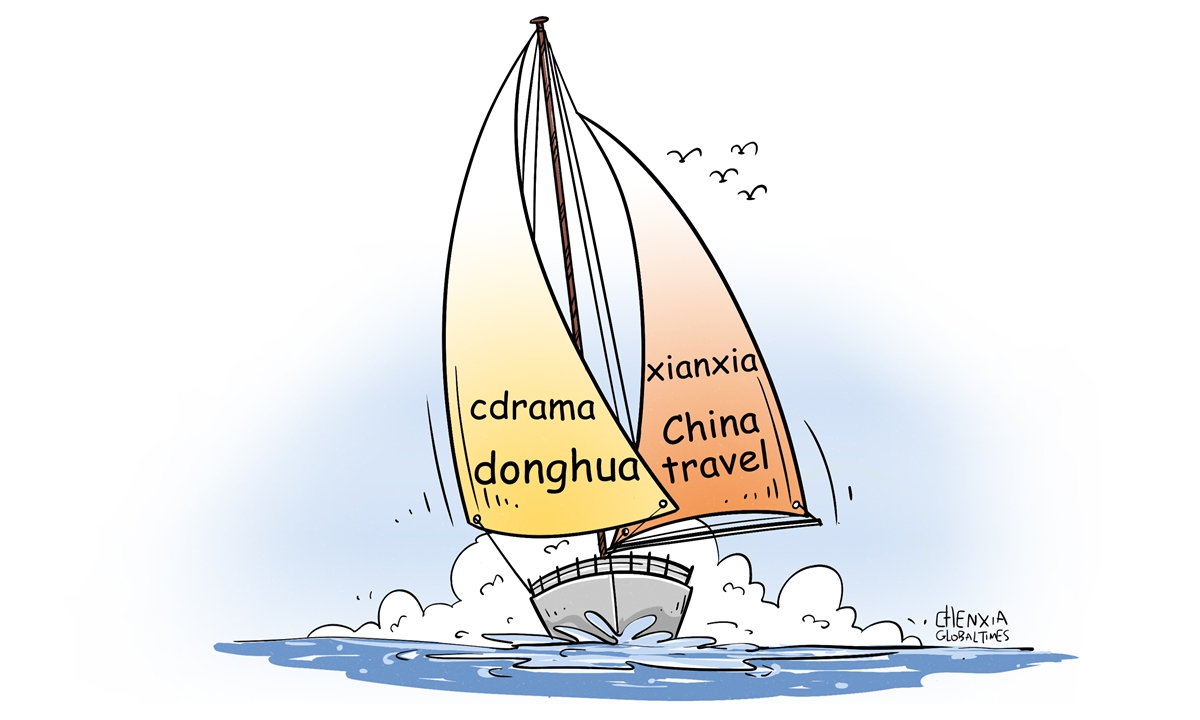ARTS / CULTURE & LEISURE
Hashtags help culture sail overseas

Illustration: Chen Xia/Global Times
Chinese animated show Zhanshen debuted on Chinese streaming platforms on July 31. Two days later, the first episode had received over 100,000 likes on TikTok, with numerous discussions in various languages such as English, Thai, Indonesian and Russian. They were mainly two questions: "Where can I watch this new animation?" and "What is the name of this animation?"Long and difficult to understand, Chinese names are often the first threshold foreigners must overcome to appreciate Chinese animation.
It is not a big problem as foreign followers can always reach an agreement on "what name" to call a work before the official English name is released. In this case they have settled on Battle through the Heavens, which is easier to remember and becomes a key to unlock the code of Chinese culture.
Together with #C-dramas, hashtags used by overseas followers like #donghua (cartoons), #xianxia (Lit: immortal heroes) and #Chinatravel are trending on overseas social media and video platforms like TikTok and YouTube.
Under them, millions of short videos and billions of views and likes prove that online novels, streaming dramas and animated works are becoming China's name card in the era of digital culture. As of August 1, the "C-drama" hashtag has about 1.8 million works on TikTok. If other entries such as "Chinesedrama" or "dramachina" are added, the total number of works exceeds 4 million.
Outside the English-speaking world, Chinese TV series have also gained a large number of fans. Vietnamese, Thai, Russian and other users not only learn about and discuss their favorite Chinese dramas in English, but also create introductions in their own languages. Besides this, they also voluntarily translate hit TV series into multiple languages.
Thanks to them, donghua, manhua (Chinese comics), xianxia, and wuxia (martial heroes) have turned into hashtags, sparking interests among more and more Gen Zers globally.
Quite different from the way Japan and South Korea's culture has expanded overseas, Chinese online novels, animations and streaming dramas' popularity overseas has been developing based on traditional Chinese culture right from the very beginning.
"Wuxia" and "xianxia" first became hits because these works inherit the style of ancient Chinese fantasy novels and martial arts novels, and incorporate Taoist culture while being full of fantasy elements and descriptions of love, friendship, and faith. In terms of visual presentation, from background drawing to character modeling, they also clearly highlight Chinese landscapes, ink techniques, East Asian looks and China's traditional clothing. Such cultural barriers have not blocked hardcore fans. Instead, they have discussions and recommend works to each other.
The world of xianxia opened by the cooperation of online literature and animation is full of not only unique cultural accumulation and magnificent imagination, but also unique visuals. Different from 2D animated movies in Japan, most Chinese tales and comics are produced in 3D.
Overseas fans can be regarded as an unexpected gain for China's cultural industry. Although China's major streaming sites have overseas platforms, most content, including streaming dramas and animated works, are not released overseas until they have finished their domestic runs.
Different from Japan and South Korea's strategy of creating content based on overseas culture, creators in China are encouraged to produce specialty content inspired by China's fine traditional culture.
The success of China's culture industry comes from the clustered industry model and "team battle" strategy when it comes to using IP. Many tech giants like Tencent have different major business sectors, ranging from online literature to film and television, animation and e-sports. After a category or IP makes a breakthrough, companies can quickly react to enlarge the IPs influence and establish a better reputation.
Overseas fans have also gradually become accustomed to the concept of having a single IP extend across novels, animation and streaming dramas. With this in mind, they actively look for more Chinese cultural works.
As more and more travelers visit China, many become more curious about Chinese culture. It seems that the hashtag #Chinatravel has added its magic to introducing the charm of Chinese culture. The unexpected overseas success of Chinese online novels, streaming series and animation reveals the unique charm of Chinese culture, expression and lifestyle.
The author is a reporter with the Global Times. life@globaltimes.com.cn




